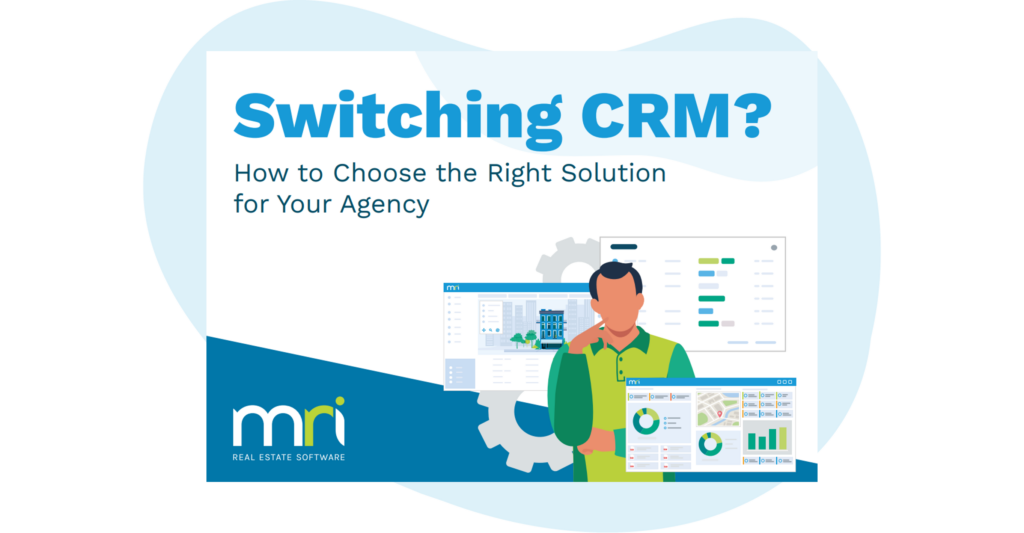What is a real estate CRM and why is it important?
Wondering what a CRM in real estate is? CRM stands for Customer Relationship Management, and this software can be of great value to real estate agencies who need the technology and resources to stay on top of attracting, maintaining, and managing their customers.
As a real estate agency, you are constantly juggling multiple clients, leads, listings, and contracts that can quickly become messy if you aren’t incredibly disciplined with your management processes. A real estate CRM significantly alleviates this pressure by handling all of these responsibilities and processes for you.
Even better, CRM software can optimise real estate reporting and real estate trust accounting to deliver streamlined and valuable insights and results that will elevate your business to new heights. CRM for real estate agencies is designed to solve problems, automate tasks, and further improve the relationships you have with your clients.
At MRI Software, we have created state-of-the-art CRM software that will transform the way your agency conducts its business. With robust features and useful management capabilities, our CRM software will fully optimise every part of your agency.
What is a CRM in real estate? It’s your key to a more productive and fruitful future.

What is a Real Estate CRM?
Having access to a robust CRM in real estate allows your agency to easily manage your customer relations, business decisions, and other vital processes from a single piece of software. This platform is typically cloud based, is available on your computer or on your phone, and is accessible by anyone on your team.
With a robust and effective CRM solution, your agency will have the freedom to manage important decisions wherever they are, while automatically communicating these decisions to one another through the platform.
Whether you are in the office, at home, or on the road, you will be able to quickly access your CRM software wherever and whenever you require.
The benefits of operating your real estate agency through a CRM include:
- Manage new leads for your real estate agency
- Manage, negotiate, and settle contracts
- Improve your prospecting and client relationships
- Stay on top of your listings and sales
- Streamline your accounting and settlement
- Gain access to valuable data, insights, and performance evaluations
- And so much more!
What is a CRM in real estate? It is an all-in-one toolbox for your business that handles and streamlines all the jobs, tasks, and management responsibilities that you and your team don’t have time to do. It ensures your clients remain satisfied and your agency is best placed to make significant strides forward as a business.
Why Should You Invest in a Real Estate CRM?
Investing in a real estate CRM for your agency will give you the freedom to innovate, experiment, and grow your business. You’ve already invested so much time, money, and energy into building and fostering your database, building new relationships with clients, breaking into new markets while maintaining the ones you currently occupy, and so much more to ensure your business is where it currently is.
Now it is time to let some of those tasks and responsibilities be handled by trusted software that will optimise your processes moving forward.
Helps to Automate Your Sales and Marketing Processes
A CRM allows you to capture and organise leads from various sources, such as your website, social media, and property listings. It automates the process of entering lead information, tracking interactions, and assigning leads to agents or teams based on predefined rules. This ensures that no leads are missed and helps streamline the lead nurturing process.
With a CRM, you can create email templates and automated email campaigns tailored to different segments of your leads or clients. By setting up triggers and workflows, you can automate the delivery of personalised emails at specific times or based on certain actions, such as website visits or inquiries. This saves time and ensures consistent communication with prospects and clients.
And finally, a real estate CRM enables you to set up automated tasks, reminders, and notifications for follow-ups, property showings, contract renewals, or any other important activities. This helps you stay on top of things, reduces the chance of missing important deadlines or appointments, and ensures that no opportunities slip through the cracks.
Gain Valuable Insights into Leads
A real estate CRM allows you to collect and store detailed information about your leads, such as their contact details, preferences, property requirements, and communication history. By having all this data in one centralised system that can be accessed by all of your team members, you can gain a comprehensive view of each lead, enabling you to better understand their needs and preferences.
With CRM software, you can track and monitor all interactions and activities related to each lead including:
- email exchanges
- website visits
- property inquiries
- phone calls
By capturing and analysing this data, you can gain insights into lead engagement levels, the types of properties they are interested in, and their overall responsiveness.
Additionally, a real estate CRM provides analytics and reporting features that allow you to analyse lead data and generate insightful reports. You can track metrics such as lead conversion rates, source effectiveness, lead response time, and overall lead pipeline performance. These analytics help you identify trends, assess the success of marketing campaigns, and make data-driven decisions to optimise your lead generation and conversion strategies.
Aids with Lead Prioritisation
CRM systems often include lead scoring functionality. Lead scoring assigns a numerical value or score to each lead based on predefined criteria and their interactions with your business. These criteria can include factors such as engagement level, demographic information, property preferences, and behaviours – website visits, email opens, form submissions. By setting up a lead scoring model, you can automatically assign scores to leads, allowing you to prioritise those with higher scores as they indicate a higher likelihood of conversion.
Likewise, CRM designed for agencies tracks lead activities and interactions across multiple channels such as website visits, email interactions, and social media engagements. By capturing this data, the CRM provides insights into lead behaviour and engagement levels. Analysing these activities can help you identify leads who are actively engaged, showing strong interest, or exhibiting buying signals. These active and engaged leads can be prioritised for more immediate follow-up and nurturing.
Improves the Quality of Lead Nurturing
Real estate CRM technology helps to improve the quality of lead nurturing by consolidating all lead information in one centralised database. This includes contact details, property preferences, communication history, and any other relevant data. Having a complete view of each lead’s information allows you to personalise your nurturing efforts based on their specific needs and interests.
A real estate CRM also enables you to segment leads based on various criteria, such as location, property type, budget, or stage in the sales cycle. By segmenting your leads, you can tailor your nurturing strategies and messages to each segment’s unique characteristics. This ensures that your communication is relevant and resonates with each lead group.
Centralises Customer Data
A real estate CRM serves as a central repository for storing and organising customer data. It allows you to capture and consolidate information from various sources, such as contact forms, website inquiries, email interactions, and phone calls. By centralising this data, you have a comprehensive view of each customer’s information in one place.
From there, you have access to robust contact management capabilities. It allows you to create detailed customer profiles that include contact details, personal information, property preferences, and any other relevant data. This comprehensive customer profile acts as a central hub for all customer-related information.
And finally, real estate CRMs often integrate with other systems and platforms, such as email marketing tools, property listing websites, or social media platforms. These integrations facilitate data exchange between different systems, ensuring that customer data remains consistent and up to date across various channels.
Try Our Powerful Real Estate CRM
What is a CRM in real estate? It is software that manages your client relationships, automates workflow, tracks and reports on the quality of your leads, enables collaboration between team members, and creates efficiencies within your business.
MRI Software’s powerful, innovative, and easy-to-use Real Estate CRM software is designed to transform the way agencies conduct their business. With valuable time-saving capabilities and robust features, we have a range of options to help your real estate agency fully optimise its processes and maximise your client relationships.
To discover the wealth of possibilities available with our real estate CRM software, book your demo today.
8 Real Estate Video Ideas to Optimise Your Agency Brand
Video marketing is the newest and most effective way to promote your real estate agency brand. However, with video still relatively new to the mainstream and still changing everyday it can be difficult to know where to start. This eBook contains 8 re…

